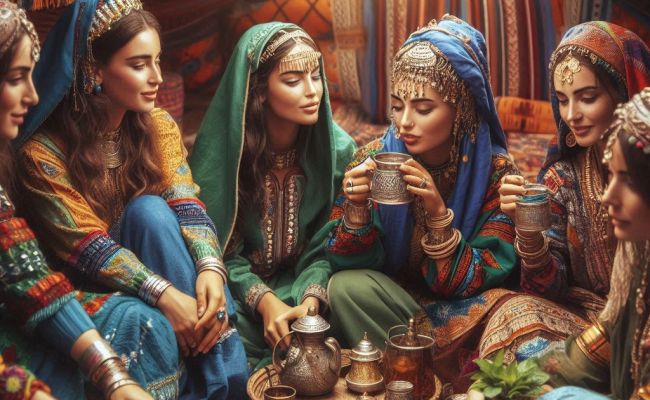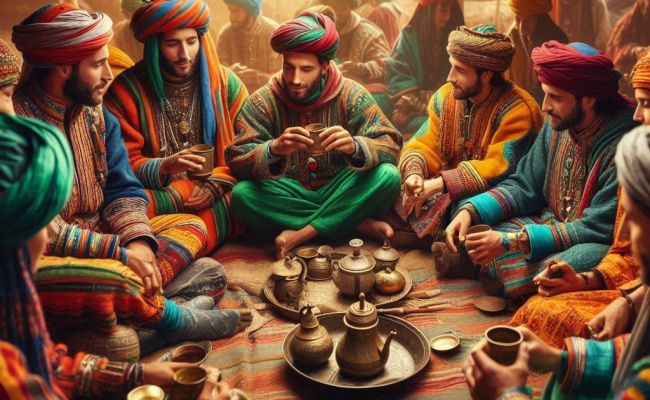The Berbers, also known as Amazigh, are indigenous peoples of North Africa, particularly in the Maghreb region, which includes Morocco, Algeria, Tunisia, Libya, Mauritania, and sections of Western Sahara. They have a deep and ancient history, dating back to prehistoric times, and retain a distinct cultural identity despite centuries of external influence.
History
The Berber people’s history in North Africa spans millennia, dating back to prehistoric times. They prospered in varied locations, such as the Atlas Mountains and the Sahara Desert, building intricate agricultural and commerce systems that defined their cultural identity. Berbers interacted with civilizations like the Phoenicians, Romans, and Byzantines throughout antiquity, exerting both influence and receiving impact. When Islam emerged in the 7th century CE, Berbers accepted it, resulting in the formation of powerful Islamic kingdoms such as the Almoravids and Almohads.
European colonialism in the nineteenth century brought considerable changes to Berber areas, although Berber groups fought to protect their cultural heritage and autonomy. Berber identity has resurfaced in the twentieth and twenty-first centuries, with advocates arguing for the acknowledgment of Amazigh languages, cultural practices, and political rights within modern nation-states. Today, Berbers continue to commemorate their past through festivals and language preservation efforts, demonstrating resilience, adaptation, and cultural continuity in the face of changing regional dynamics in North Africa.

Mythology
According to the Roman historian Gaius Sallustius Crispus, the original people of North Africa were the Gaetulians and the Libyans, who were prehistoric peoples who crossed from Iberia to Africa. Much later, Hercules and his army crossed from Iberia to North Africa, where they intermarried with the local populace and permanently settled the region.
Languages
Berber languages, which are part of the Afroasiatic language family, comprise numerous closely related dialects like Riffian, Kabyle, Shilha, and Tamasheq. While many Berbers speak Arabic and French, Tamazight is the general term for all Berber languages. These languages have assimilated an extensive Arabic vocabulary, with Arabic loanwords accounting for up to 51.7% of Tarifit and approximately 35–46% of Kabyle.
Despite this, Berber languages have influenced local Arabic dialects, accounting for a modest percentage of theira vocabulary. 14 to 16 million people speak Berber languages, primarily in Morocco and Algeria, with smaller populations in Mali, Niger, Libya, Egypt, and Burkina Faso.
Religion
Language, religion, and ethnicity are all aspects of the Berber identity, which is based on North African geography and history. Despite their diversity, Berbers maintain a strong sense of identity, rooted in their ancestry and history, often reinforced by their language. Some Berber populations, such as the Mozabite Berbers in Algeria and the Libyan Berbers in the Nafusa Mountains, practice Ibadi Islam, which is predominantly Sunni due to the advent of Islam.
Before the arrival of Abrahamic religions, Berbers had a traditional religion that included ancestor worship, polytheism, and animism. Other African religions, as well as Punic, Judaic, and Hellenistic religions, influenced their beliefs. These ancient customs are still incorporated into Berber culture.
Until the 1960s, Morocco had a considerable Jewish Berber community, but the majority left for Israel and France, leaving only a few hundred people. Recently, there has been an increase in Christian Berbers, particularly in Algeria and Morocco, with some converting in order to reconnect with their supposed Christian heritage. Thousands of Tunisian Berber Muslims have converted to Christianity.
Culture
The Berbers’ traditional social structure is tribal, with chiefs nominated for each tribe. Historically, powerful women headed various tribes, like Dihya and Tin Hinan. Today, men lead most tribes; however, certain regions, like the Tuareg, have hierarchical systems led by a king known as the Amenokal. In Algeria, tribe elders have the right to levy fines and sanctions against criminals. The Mozabites, who live communally, are supervised by spiritual Ibadi leaders.
Marriage customs differ throughout tribes; men usually choose their brides; however, in Tuareg culture, women choose their husbands. Family arrangements vary by tribe and might be patriarchal or matriarchal. Men have historically handled livestock and followed grazing cycles, but women manage home tasks and make handicrafts for personal use and sale in local marketplaces.
